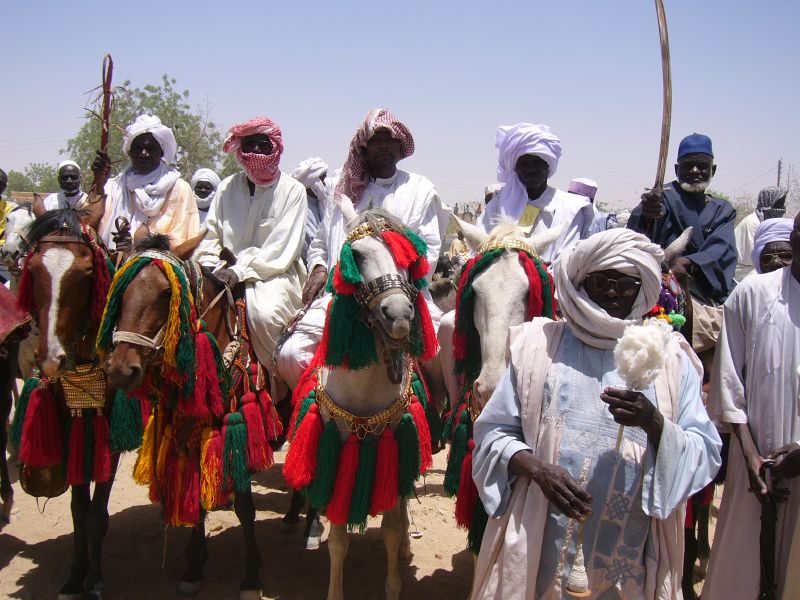Difference between revisions of "About Chad"
(Created page with "{{#eimage:http://upload.wikimedia.org/wikipedia/commons/5/5c/Chadian_delegation.jpg|410x579px|thumb|'''A Chadian delegation.'''<BR/>Source: Wikipedia.org.}} Chad, part of...") |
m |
||
| Line 3: | Line 3: | ||
[[Chad]], part of [[France]]'s African holdings until 1960, endured three decades of civil warfare, as well as invasions by [[Libya]], before a semblance of peace was finally restored in 1990. The government eventually drafted a democratic constitution and held flawed presidential elections in 1996 and 2001. In 1998, a rebellion broke out in northern [[Chad]], which has sporadically flared up despite several peace agreements between the government and the insurgents. In 2005, new rebel groups emerged in western [[Sudan]] and made probing attacks into eastern [[Chad]] despite signing peace agreements in December 2006 and October 2007. In June 2005, President Idriss DEBY held a referendum successfully removing constitutional term limits and won another controversial election in 2006. Sporadic rebel campaigns continued throughout 2006 and 2007. The capital experienced a significant insurrection in early 2008, but has had no significant rebel threats since then, in part due to [[Chad]]'s 2010 rapprochement with [[Sudan]], which previously used Chadian rebels as proxies. DEBY in 2011 was reelected to his fourth term in an election that [[international]] observers described as proceeding without incident. Power remains in the hands of an ethnic minority. In January 2014, [[Chad]] began a two year rotation on the UN Security Council. | [[Chad]], part of [[France]]'s African holdings until 1960, endured three decades of civil warfare, as well as invasions by [[Libya]], before a semblance of peace was finally restored in 1990. The government eventually drafted a democratic constitution and held flawed presidential elections in 1996 and 2001. In 1998, a rebellion broke out in northern [[Chad]], which has sporadically flared up despite several peace agreements between the government and the insurgents. In 2005, new rebel groups emerged in western [[Sudan]] and made probing attacks into eastern [[Chad]] despite signing peace agreements in December 2006 and October 2007. In June 2005, President Idriss DEBY held a referendum successfully removing constitutional term limits and won another controversial election in 2006. Sporadic rebel campaigns continued throughout 2006 and 2007. The capital experienced a significant insurrection in early 2008, but has had no significant rebel threats since then, in part due to [[Chad]]'s 2010 rapprochement with [[Sudan]], which previously used Chadian rebels as proxies. DEBY in 2011 was reelected to his fourth term in an election that [[international]] observers described as proceeding without incident. Power remains in the hands of an ethnic minority. In January 2014, [[Chad]] began a two year rotation on the UN Security Council. | ||
| − | Source: | + | Source: www.cia.gov/library/publications/the-world-factbook/geos/cd.html |
Back to [[Adopting from Chad]] | Back to [[Adopting from Chad]] | ||
Latest revision as of 05:27, 24 March 2018
Chad, part of France's African holdings until 1960, endured three decades of civil warfare, as well as invasions by Libya, before a semblance of peace was finally restored in 1990. The government eventually drafted a democratic constitution and held flawed presidential elections in 1996 and 2001. In 1998, a rebellion broke out in northern Chad, which has sporadically flared up despite several peace agreements between the government and the insurgents. In 2005, new rebel groups emerged in western Sudan and made probing attacks into eastern Chad despite signing peace agreements in December 2006 and October 2007. In June 2005, President Idriss DEBY held a referendum successfully removing constitutional term limits and won another controversial election in 2006. Sporadic rebel campaigns continued throughout 2006 and 2007. The capital experienced a significant insurrection in early 2008, but has had no significant rebel threats since then, in part due to Chad's 2010 rapprochement with Sudan, which previously used Chadian rebels as proxies. DEBY in 2011 was reelected to his fourth term in an election that international observers described as proceeding without incident. Power remains in the hands of an ethnic minority. In January 2014, Chad began a two year rotation on the UN Security Council.
Source: www.cia.gov/library/publications/the-world-factbook/geos/cd.html
Back to Adopting from Chad
